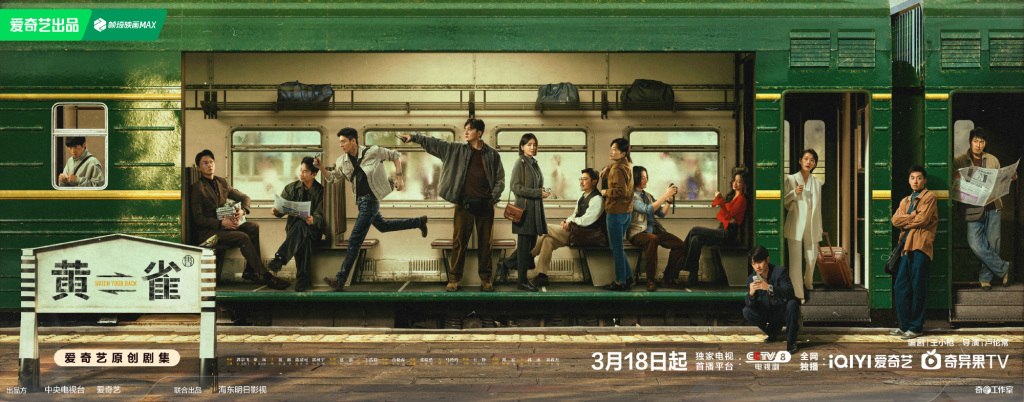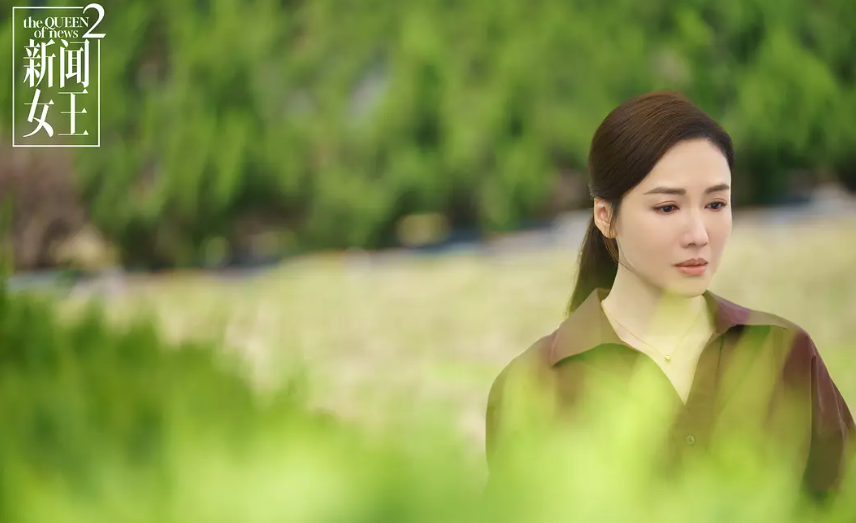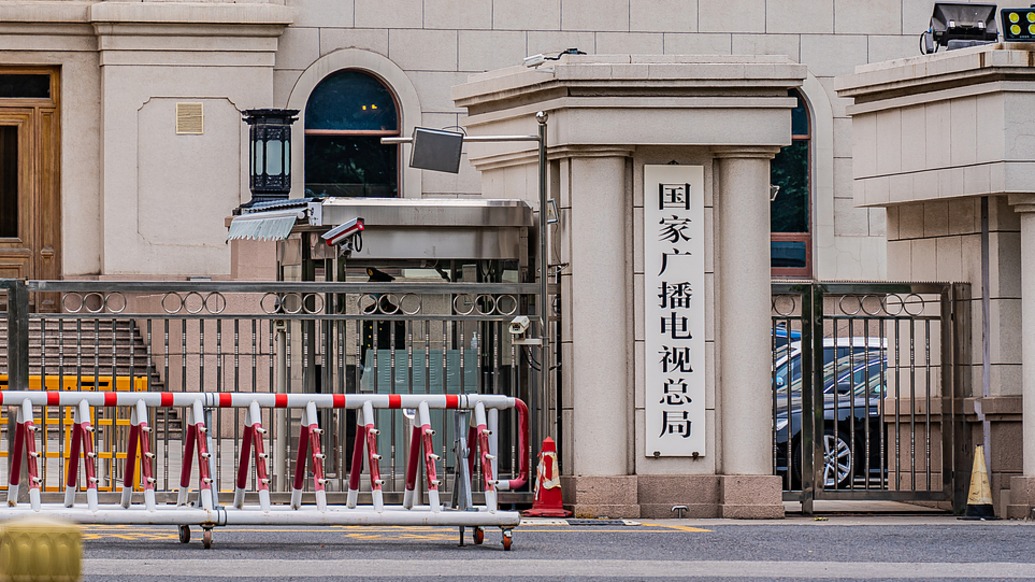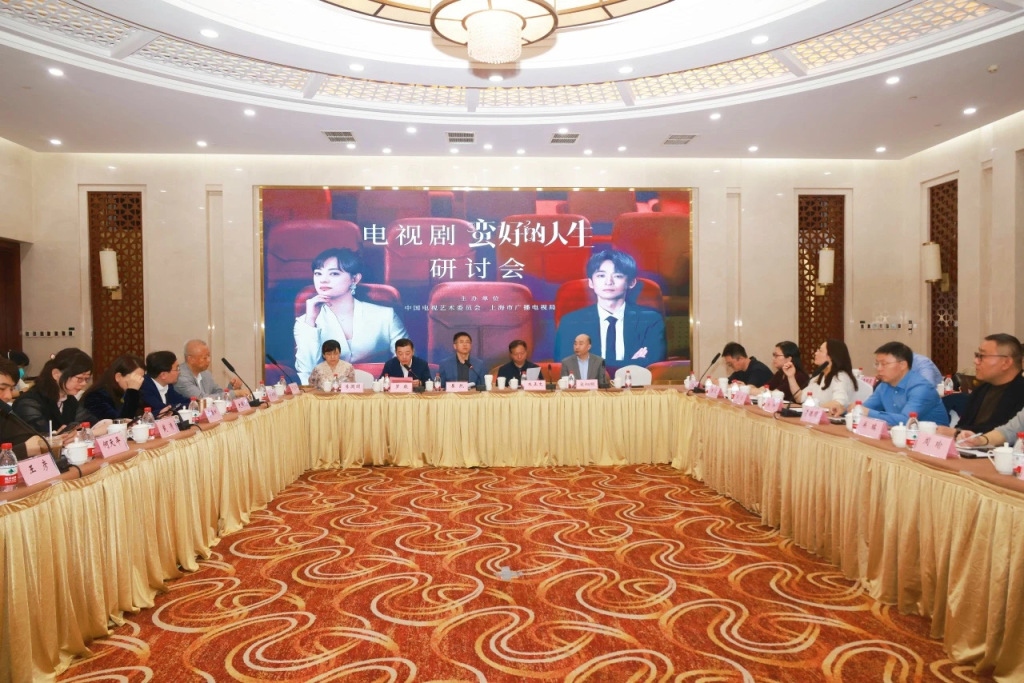
"A screenwriter is like a cook. Every restaurant has shredded pork with fish flavor and roast duck, but I hope to serve a dish that no one has ever seen."
In screenwriter Wang Xiaoqiang's creative philosophy, this obsession with "differential expression" runs through it all. From embedding the midlife crisis into the spy war narrative in "Rivals", to focusing on the daily work of grassroots cadres in "County Party Committee Compound", which rarely appears on the screen, to the recent "Yellow Bird" which uses the anti-pickpocket police and thieves as the incision, each of his works seeks a new expression path within the typological framework.
Wang Xiaoqiang expressed his hope to create a new path in the crowded criminal investigation genre with his recently aired TV series Yellow Bird. This anti-pickpocket drama, set in a train station around the turn of the millennium, shows the various aspects of crime such as thieves, fraud, and pyramid schemes through the interweaving of the good and the bad.

Poster of Yellow Bird
In order to make the story and characters more credible, he went to the Public Security Bureau to experience life and worked with anti-pickpocket police to catch thieves. He also brought up his own experience of being cheated many years ago. The 80-yuan lighter that appeared in the play was Wang Xiaoqiang's "true blood and tears lesson".
What is impressive is that the portrayal of the criminal group in "Yellow Bird" is not a simple facial stereotype, but also allows the audience to see more realistic levels in the "enemy and friend" type of drama. Wang Xiaoqiang believes that the charm of group dramas lies in the fact that all the characters and their relationships will form a "butterfly effect"-like synergy in the narrative-each character's actions may trigger a chain reaction, and this complexity is a mirror image of real life.

Character relationship chart of Yellow Bird
When talking about the current state of the industry, Wang Xiaoqiang has a clear understanding: when mainstream themes are consumed repeatedly, the audience's aesthetic fatigue is inevitable, and in the future, "popular hits" will gradually give way to "user customization." But even if the industry trend of "long dramas turning into short dramas" is inevitable, he insists on not blindly pursuing a faster pace. He believes that the size of a drama should be determined by the core story, rather than the labeling requirements of the external environment. "A Dream of Red Mansions cannot be compressed into a short drama, and A New Account of Tales of the World is also difficult to lengthen."
In an era dominated by “long plays turned into short plays” and “watching at double speed”, how can we make the audience slow down and immerse themselves in the story? In Wang Xiaoqiang’s view, the answer may be hidden in those forgotten corners - those marginal characters swept away by the tide of the times, those complex and real group relationships, and those moments that reflect the brilliance of human nature in the folds, which can all become the key to open new narratives. The task of the screenwriter is to find those stories that have not yet been told.

On June 26, 2024, at the 29th Shanghai TV Festival, Wang Xiaoqiang attended the Magnolia Award judges meeting.
【dialogue】
Catching a thief is harder than I thought.
The Paper : When watching The Yellow Bird, the audience almost forgets that we once lived through an era when thieves were so arrogant. This is an almost forgotten history. For memories of such an era, would it be difficult to collect data in the early stages of research?
Wang Xiaoqiang : It’s not bad. Generally speaking, the number of thieves has indeed decreased a lot, but there are still some. The most difficult thing is to experience life. I went to a criminal police brigade of the Shenyang Public Security Bureau before, and followed a detachment leader. I went to work with him every day and ate in the cafeteria with him after returning. I spent a lot of energy studying what the police think and what the thieves think. What we present in the drama now is basically what we learned during that period.
For example, thieves can be divided into many different types of groups, and there is a chain of contempt among their factions. Some are technical, some are gangs, some are individuals, some are fixed, some are mobile, some are particular about appearances, and some don't care at all. They are even divided by the scene. Some specialize in eating on trains, some specialize in stealing on buses, some specialize in stealing in shopping malls, and some specialize in stealing at concerts and sports games. They are all subdivided tracks.
The Paper : What is the chain of contempt among these schools?
Wang Xiaoqiang : Simply put, they will respect whoever has the best skills. They all despise those who steal and rob. For example, if someone steals someone's earrings on the street, it's too stupid and it hurts people. In terms of morality, they also have a contempt chain. Generally speaking, they don't look down on those who steal money from patients and their families, and those who steal things in the hospital. They think that this is retribution, and we should not help others, but we should not harm others.

Stills from Yellow Bird
The Paper : Can you talk about the details of this survey? You mentioned that following the police, walking around in circles on the bus and subway, seemed like a very long and boring process?
Wang Xiaoqiang : Yes, catching thieves is harder than I thought. I thought I would catch several of them in one trip, but later I found that I could not catch even one in three days.
For example, when I followed the police to catch thieves on buses and subways, the report rate at certain stations on a certain subway line increased significantly last month, which means that there were more thieves active at these stations. Then they would focus on these stations and go back and forth to these stations again and again.
Catching a thief is not like investigating a serious crime, where there are clues at the scene. I followed the police and sat in the subway again and again, observing the people on the train. The police are very experienced. If they see someone who looks like a thief, they will follow him until he makes a move. They will catch him in the act and catch him red-handed. And the owner of the lost item must cooperate, admit that he lost the item, and be willing to make a statement, for this to be established. So the whole process is very long and tedious, and the success rate is very low.
The Paper : The train station in the drama is used as a dramatic setting, integrating the most common forms of crime in the millennium, from petty theft to fraud to pyramid schemes, showing a very complete range of crimes. Have you actually experienced any of them?
Wang Xiaoqiang : I learned a lot of things during research, and of course I saw some of them with my own eyes. I was also studying in another city at the time, and I often had to take the train to and from school. Once, when I got out of the train station, I saw many stalls in the square. There was one selling stainless steel lighters, and the sign said five yuan each. I thought it was cheap, so I bought one. But I was afraid of being cheated, so I repeatedly confirmed with him: Is this really five yuan? He said it was really five yuan.
After confirming several times, I said I would buy one. He said that if you decide, you won't return it after it's inflated. Hey, I was confused when I heard this, maybe there was something behind his words, but after asking again and again, there was no problem, so I bought it anyway. Once it was inflated, he asked for 80 yuan. I said, "Brother, you said five yuan." He said it was five yuan, and then pointed to the sign, there was a place that you couldn't see when it was folded: 5 yuan off, the original price was 85 yuan.

Stills from Yellow Bird
Weaving a group of characters like a spider web
The Paper : The most difficult part of writing this play is the group portrait. It uses the train station as a setting to unfold the struggle between many characters from both sides of the story. In addition to the main line of the struggle, it also creates a large number of peripheral events and characters. Why do you want to create such a complex group portrait? How do you build this framework during the creation?
Wang Xiaoqiang : When I wrote Yellow Bird, I had just finished The Rival . The Rival is still a relatively traditional drama structure, how Guo Jingfei and Tan Zhuo face the pressure from the good and evil sides - Yan Bingyan and Ning Li, and then experience a series of unit events. I don't particularly want to write something similar again, and Yellow Bird is the first original police theme I wrote, so I still want to have some breakthroughs or something different.
I saw a review before, which talked about why many stories with thieves as the protagonists are interesting. For example, there are stories like Swallow and Li San in our Chinese classical literature. Hong Kong films also loved to have chivalrous thieves as the protagonists. Foreign films also loved to have supernatural thieves. There will be many exciting and adventurous things in the stories that the audience loves to watch.
But for Yellow Bird, I didn't want to write a story about a thief, and I couldn't be too fanciful, so I tried to think from the perspective of the characters, so that each character had his own very reasonable logic, his growth, family and relationship with other characters, and tried to make each character three-dimensional, which would take a lot of energy and effort. In addition, these thieves are divided into different groups, so when it comes to script creation, it is indeed richer and more difficult to write than the plays and characters I have written before.

Stills from Yellow Bird
The Paper : Almost every character in the play has some connection with other characters. During the creative process, do you write while drawing the characters?
Wang Xiaoqiang : This play requires character drawings, just like building a building, which requires very detailed drawings. Because it is so complicated, the drawings must also be drawn in great detail.
It was really hard to draw this picture in the early stage. I still hope that each character can appear effectively, and try to connect and echo each other, the past and the present. For example, when Li Xiaolian found her brother, Sister Hua was there, Guo Jingfei and Zu Feng also passed by each other, and the victim Jiang Jifeng who appeared earlier was later found to be in a triangle relationship with Guo Jingfei and Fang Hui. The relationship between the characters this time is like a spider web, with each thread connected to each other, and finally it is a closed loop.

Qin Lan as Li Xiaolian

Guo Keyu as Sister Hua
The Paper : All the characters in the story need to form a "combined force" like the butterfly effect. Do you write very long biographies of the characters in your works?
Wang Xiaoqiang : Yes, and actually I have always been thinking in episodes. I will think about many things in great detail before I dare to start writing, so I basically don’t write an outline every time, I just write the episodes directly.
Writer and director, like "Arranged Marriage"
The Paper : Script writing is difficult, and the threshold for collaborators is higher, as they need to understand the details of the script. Can you also talk about your collaboration with directors and actors?
Wang Xiaoqiang : To be honest, the relationship between a screenwriter and a director is a bit like the arranged marriages of the past. Of course, you can also ask about the other person, but only after you actually enter the bridal chamber and live together, you will know what this person is really like.
Director Lu (Lu Lunchang) and I have known each other for about ten years. We worked together before "Rivals" and we know each other very well. For example, she knows the purpose of my writing this scene, whether the focus is on the scene, the lines, or the changes in the relationship between the characters. I know her very well. If there is a situation that cannot be solved in the scene and the script needs to be changed, she will not change the really important part of my script. So this kind of tacit understanding does take time and multiple collaborations to cultivate.
Of course, I also look forward to working with some excellent directors I haven't worked with before, but I currently prefer to work with people I know well. Because for screenwriters, it is easy to have a situation where you spend a lot of effort on a script, and then hand it over to a director, and when the final film comes out, it turns out to be a completely different story. This time, the creation of "Yellow Bird", whether it is the director, the production, or the actors' performances, definitely adds points to the script, there is no doubt about that.
The Paper : You are working with Guo Jingfei again this time. Can you share your experience?
Wang Xiaoqiang : We had a verbal agreement before that he would play the role in this drama, so when you were writing, you probably had a character in mind, which may have inspired you more in your creation. Mr. Guo Jingfei does have a lot of humorous details. The more dense the plot is, the more humor can be used to embellish the drama, or the more crime-type films, the less heavy it will be.
And why is the character called Guo Pengfei? The name of our play is "Yellow Bird". Dapeng is a very large bird. Everyone has a Dapeng in their heart when they are young, and they think they will be great in the future, right? For Guo Pengfei, he was full of vigor and vigor when he was young, but after experiencing the beatings of life and the slaps of fate, he finally found that he was just a small sparrow. Guo Jingfei played the vigor and vigor of this character when he was young, and the midlife crisis after middle age, and the cowardly and decadent state very well, which left a deep impression on me.

Guo Jingfei as Guo Pengfei
The Paper : Speaking of the midlife crisis, what impressed everyone the most in "Rivals" was that it was a spy story that embedded a narrative of a couple's midlife crisis. This time in "Yellow Bird", you mentioned the decadence of a young idealist heading towards a midlife crisis. Is this a theme that you want to express in your works in recent years?
Wang Xiaoqiang : This story covers a relatively long period of time, from the 1980s and 1990s to 2004. My feeling is that when people of our generation look back on the past few decades, they may feel like they have lived two lives.
I was born in 1979. The social environment, public security, economy, and concepts when I was a child were like another world compared to today. So the character of Guo Pengfei must have been greatly impacted in life and spirit under the impact of such a rapidly changing era, and he must have suffered some midlife crisis.
Of course, I may be approaching the midlife crisis, so I also unconsciously put some empathy into it. As screenwriters, we have to provide the audience with more than just a pile of plots, and we must implant some emotional resonance or some mixed feelings.
Screenwriting is a marathon, so be patient.
The Paper : “Long dramas turned into short dramas” is a curse that screenwriters cannot escape in recent years. What do you think of these five words?
Wang Xiaoqiang : We often discuss the impact of short videos on long TV series, or some creative trends brought about by watching TV series at double speed, etc. It seems that everyone wants to be fast. But I personally think that being short is not necessarily good, it is still relative.
Regarding whether the pace should be getting faster and faster, I first think that we must maintain the volume in the creation. Volume means that it is best if there is no useless role, no useless scene, no useless words in the lines, and all the creative information is valid.
There is another situation that we should pay attention to. Why do audiences abandon a show? Why do they dislike watching it? Why do they think it is too slow? It is not because of the speed, but because we should pay attention to the audience's desire for new content and new themes. From a human perspective, people are bound to get tired of the old and like the new. This problem is far greater than the so-called speed.
As a screenwriter, it is best to be able to provide a different narrative from the very beginning. For example, many police-themed stories are about cracking down on gangs, murders, and serial killers. Can we take a different approach and write about some police types that people don’t pay much attention to? For example, if I were to write a sequel to “The County Party Committee Compound”, I might not write about the county magistrate, but could I write about the security guard who has worked in the county party committee unit for his entire life? What kind of stories and observations would he have?
The Paper : Are there any TV dramas in recent years that you like? Do you think they have done something interesting in the attempt to turn long dramas into short dramas?
Wang Xiaoqiang : Let me give you an example, "Flowers" . People seem to naturally think it is a representative of classic long dramas, but if you actually observe it, its narrative rhythm is very fast, its plot density is also very high, and its production is also excellent. It is a collection of many advantages. When people talk about strong plots and fast paces, they tend to think that only suspense dramas can achieve this, but in fact, it is not. "Flowers" is not a typical strong plot, nor is it a suspense drama, but it can achieve a fast pace, and it is not fast for the sake of being fast.
The Paper : Many times, a fast pace and strong plot easily sacrifice characters and emotions, but "Fanghua" has a fast pace without losing characters, and the emotional concentration is still very high.
Wang Xiaoqiang : Yes, so I think a good drama must be all-round. It's very simple, the wooden barrel theory, no drama can become a classic drama just by having one long board.
The Paper : Earlier we talked about the feeling of "living two lives". We not only observe changes in ourselves, but also changes in the times. As a film and television practitioner, you have also witnessed the changes in the industry over the past 20 years. Can you talk about it?
Wang Xiaoqiang : As a screenwriter, I do encounter different industry signals at different times. For example, some themes are outdated and some genres are not allowed to be written. The most obvious signal in the past few years was the IP fever. Everyone came to talk about IP. I said I wanted to write original works, and some friends might have advised me not to do original works because they were too tiring and I couldn’t get out of them. I should just do IP adaptations. Now that long plays are being shortened, this may be another signal.
I think, of course, we have to face and embrace the changes in the external environment, but generally speaking, no matter how things change, they still remain essentially the same. In fact, if you look at some works from ten or twenty years ago, they can still make you feel emotional, mixed feelings, excited or sad. They can transcend time, and the core is still the combination of vivid characters, wonderful plots, and excellent performances.
Overall, I think screenwriters should keep their composure. Screenwriting is a marathon. When you run a marathon, no matter how the audience cheers you on, you have to run at a leisurely pace. If you run like crazy, you will run out of energy after a few steps. You should still look at it rationally. Good works take time. It is useless to rush.
The Paper : Looking ahead to the future development of the industry, what new trends and directions do you think are worthy of screenwriters’ attention?
Wang Xiaoqiang : In the past, the industry generally believed that if a project was well done, it would appeal to all ages, such as a play like "The Sturm und Drang". I think the chances of this happening will decrease in the future.
In the future, when we write a drama, we need to clearly define what kind of audience we are serving. We cannot have both young female audiences and the silver economy; it is not possible to have both the highly educated group and the lower-class audience. Everyone's choices are becoming more and more vertically segmented. In addition, seasonal broadcasts may become a trend.
The Paper : You majored in medicine and entered the screenwriting industry. How did you become an excellent screenwriter through your own learning?
Wang Xiaoqiang : I think we should write more and live more. Of course, these two sentences may sound a bit empty, but they are true.
"Write more" is because all writing experience and skills can only be accumulated through writing more. Just like doing surgery, if you do 10,000 surgeries and I do 100 surgeries, no matter how talented I am, I can't compare to you. Because I haven't encountered so many problems in 10,000 surgeries, I can't accumulate so much experience.
"More life", the suspension of some of our current plays is because the screenwriters did not go deeper into the characters' hearts at the drama level. For example, if I write about a judge, I think the judge is so serious, don't you go to the court to see it? If I write about an anti-theft policeman, don't you follow him to catch a thief? Many things cannot be completed through imagination.
The Paper : You have made several major career changes in your life, such as from doctor to writer, and from editor to screenwriter. If you were to make another career change in the future, what would you be looking forward to doing?
Wang Xiaoqiang : I don’t want to change anymore. I think the current situation is good. I have been lucky enough to find the combination of my career and interests. I may have found my favorite job in my life.


